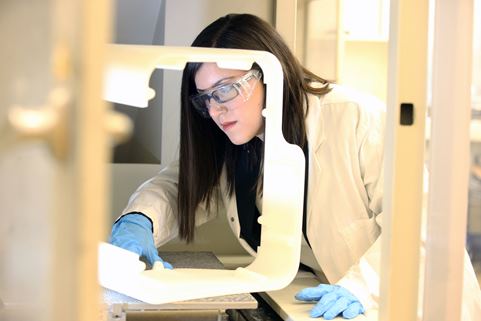Panalpina and Cardiff Business School: successful research on lean inventories expanded to include 3D printing
Three years ago, Panalpina and Cardiff University in Wales (UK), set out to search for the ‘hidden formula’ for lean inventories. This innovative partnership has allowed Panalpina to launch D2ID, a new inventory forecasting application.The co-innovation approach has been so successful, that the research is now being expanded to include new manufacturing technologies such as 3D printing.

Three years ago, Panalpina and Cardiff Business School, Cardiff University in Wales (UK), set out to search for the ‘hidden formula’ for lean inventories. This innovative partnership between the university and the global logistics and freight forwarding company has allowed the company to launch D2ID, a new inventory forecasting application. What’s more, the co-innovation approach has been so successful, that the research is now being expanded to include new manufacturing technologies such as 3D printing.
“As a result of our initial partnership we now have a new application at hand that allows us to forecast the demand of a company’s products and plan its inventory accordingly,” says Nicole Ayiomamitou (pictured), lead researcher on the knowledge transfer project which was supported by the UK government. “To achieve this, we have taken real inventory data from Panalpina and developed a unique product life cycle algorithm based on leading-edge mathematical thinking.” With this innovative partnership, Panalpina has become the first global logistics company to develop its own application that helps customers manage, forecast and reduce inventory levels in their supply chains.
“We started off by mapping the inventories of our customers across product life-cycles. The more data we analyzed, the more refined we could make our inventory forecasting model,” explains Mike Wilson, global head of logistics at Panalpina. “Thanks to bright minds like Nicole, we’ve now come to a point where we can accurately predict the points of inflection of inventories for all kinds of products across different industries. Based on that, we can estimate the maximum and minimum inventory holding for our customers.”
The benefit of this approach for Panalpina is that it can then predict how much space is needed at its facilities, where to position the facilities and what services to offer. The benefit for the customers is that they have a partner who will work with them to keep their products moving and minimize working capital requirements in their supply chains. Wilson, who graduated from Cardiff’s MBA program in 1993, calls this approach ‘Demand-Driven Inventory Dispositioning’, in short ‘D2ID’.
“We said from the beginning that we were not trying to re-invent the wheel,” says Professor Aris Syntetos of the Cardiff Business School. “Simply put, the new application works at a product level, selecting and applying the best mathematical forecasting method at the click of a button. The application has been tested on various types of products, and the results are remarkable,” adds Syntetos.
Thanks to the success of this first research and development project, Panalpina and Cardiff have launched two further two-year projects. The follow-up projects with the Cardiff Business School and the Cardiff School of Engineering launched in January 2016, will focus on new manufacturing technologies. The aim is to help Panalpina’s customers identify the right products that could be switched from traditional to new, additive manufacturing techniques such as 3D printing.
“We have a supply chain specialist and an engineer working together with leading experts at Cardiff Business School,” says Wilson. “As with the first round of research, the findings of this exciting new project will find their way into our wider offering of Logistics Manufacturing Services which has already successfully transformed the manufacturing and logistics strategy of important Panalpina high-tech customers.”
About Cardiff Business School, Cardiff University
Cardiff Business School is widely recognised as one of the leading business schools in the UK. In the latest UK Government Research Assessment Exercise, it was ranked fourth of the UK’s 96 business and management schools for the quality of its research, with 35% of its research projects classified as ‘world leading’. It has recently become the first business school in Wales, and the sixth Russell Group institution, to be awarded accreditation from the Association to Advance Collegiate Schools of Business (AACSB), a hallmark of business school excellence which is awarded to less than 5% of the world’s business schools. It is the largest single School of Cardiff University, itself a Russell Group organisation, and educates over 2,600 students from 60 countries each year.
